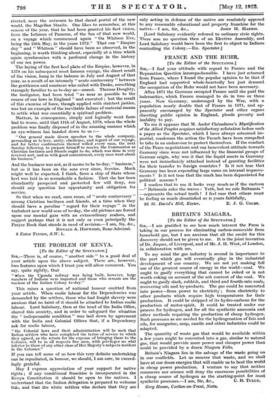BRITAIN'S NIAGARA.
[To the Editor of the SPECTATOR.] Sin,—I am gratified to see how much interest the Press is taking in our process for eliminating carbon-monoxide from household gas, but I am anxious that all the credit for this discovery should not be given to me. It is the joint invention of Dr. Jaques, of Liverpool, and of Mr. J. H. West, of London, in collaboration with me.
To my mind the gas industry is second in importance to the part which gas will eventually play in the industrial development of our country. We are not yet making full use of the greatest source of energy in the world—coal. We ought to gasify everything that cannot be coked or is not worth coking on account of the ash content of the coal. We ought to gasify slack, rubbish, and third and fourth-rate coals, recovering oils and by-products. The gas could be converted into power—from power to electricity ; from electricity to other products which require high temperatures for their production. It could be stripped of its hydro-carbons for the production of motor-spirit. It could be treated under our process for hydrogen, and for all the synthetic ammonia and other methods requiring the production of cheap hydrogen. Such processes as are needed for the hydrogenation of fats and oils, for margarine, soap, candle and other industries could be adapted.
The quantity of waste gas that would be available within a few years might be converted into a gas, similar to natural gas, that would provide more power and cheaper power than could be provided by a dozen Niagara Falls.
Britain's Niagara lies in the salvage of the waste going on in our coalfields. Let us recover that waste, and we shall have at our doom energies that will enable us to beat the world in cheap power production. I venture to say that neither commerce nor science will deny the enormous possibilities of a cheap source of hydrogen as the starting-point for most


















































 Previous page
Previous page